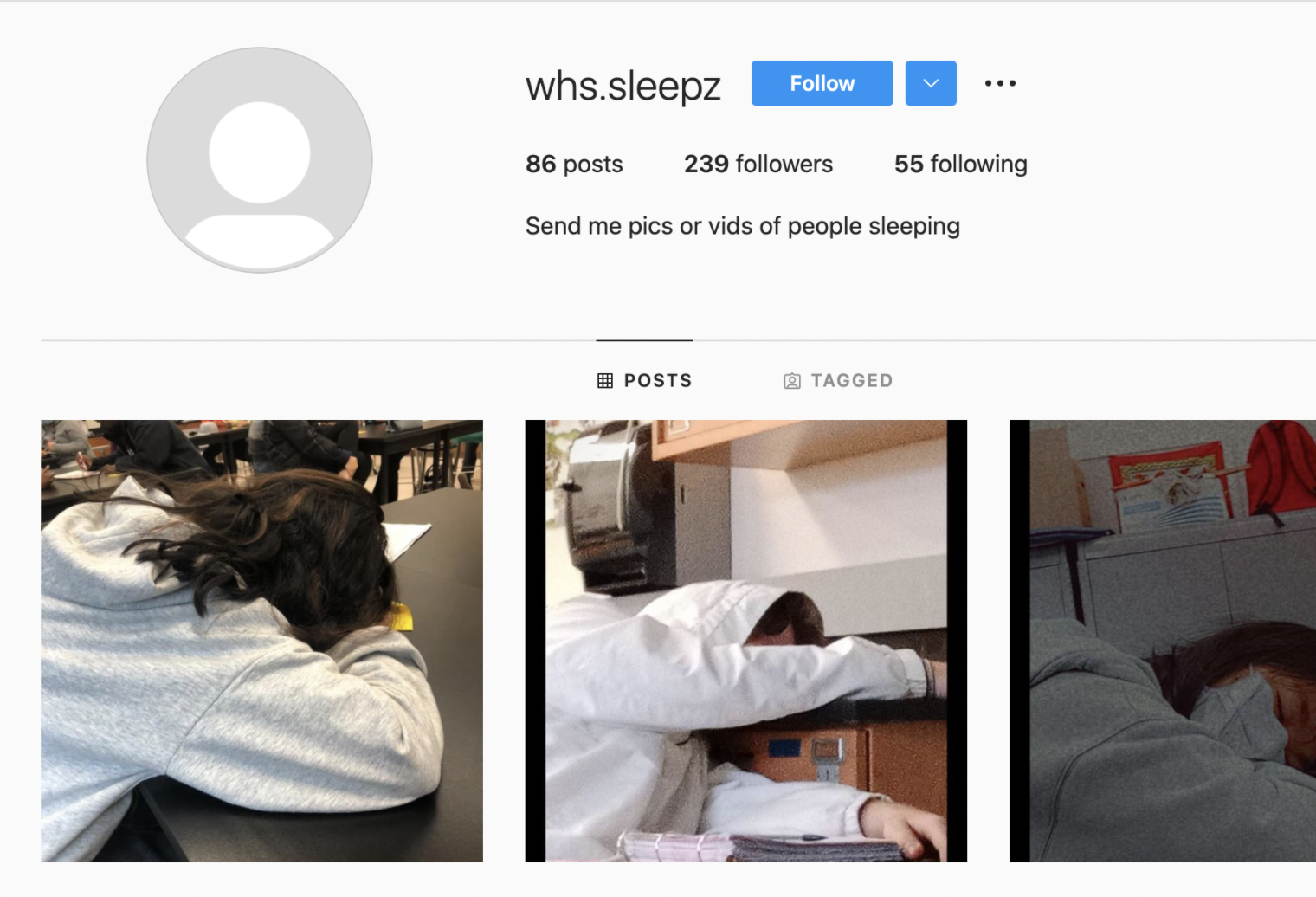Image provided by author.
The start of the 2021-22 school year has brought students back to in-person school after nearly two years of distance learning. This return sparked a new trend which originated on TikTok, where students expose other students’ bad habits. The posts include videos of students sleeping in class, having bad posture, and parking incorrectly. This has quickly turned into entire Instagram pages dedicated to each category. The content of the pages has turned from good-natured posts, such as bad parking, to posts that are violating, such as people’s feet in the bathroom.
So what is the purpose behind these posts? They seem to celebrate the quirks and oddities of being back in school, surrounded by so many people. After being isolated for so long, students find things that used to be quite ordinary, such as catching students sleeping in class or seeing their feet under bathroom stalls, very funny. Wilhelm Scholz, a senior, says, “It’s for the shock value. People do this thinking it’s ‘humor.’” Many students seem to agree that while these posts are embarrassing and nonconsensual, there is an aspect of hilarity to them. Riley Pearson, another senior, says, “It’s a bad thing to do, but I can appreciate the comedy behind it.” However, he also says, “I don’t want to be the subject of them.”
Out of all of the pages, the “Bad Parking” Instagram page seems to be the most defensible in regards to violating student privacy. “I don’t mind the bad parking one, because it adds incentive to park better, and drive better in general,” says senior Nathaniel Law. “I think high schoolers need to be held accountable to safe driving practices.” Pearson agrees, saying “The bad parking one is good. As long as you don’t target anyone by name or face, it’s okay.”
The Instagram page that has the least amount of support and is the most inappropriate is the “Bathroom Feet” page. This page features students’ feet under the stalls of the bathrooms without their knowledge or consent. When asked about this page in particular, students were quick to agree that they are a violation of privacy. Law says, “There is no purpose to them, other than embarrassing other people. If I saw myself in one of them, I would be horrified. It makes me nervous to use the bathroom sometimes.” Scholz agrees, saying, “I think they are bad. It’s a massive invasion of privacy, and no one should have to think about being recorded in a private space, like a bathroom. It feels mean-spirited.”
Many students who were in these posts do not even find out that they were photographed in a private space until someone else informs them. A student who was actually featured in a post without their consent says, “I think it is totally unnecessary. I think high school students should be mature enough to know what’s something that’s appropriate/ inappropriate, legal/illegal to do.” The rise of these pages brings forth the question of how much control the school should have over what students post on social media. When asked if the administration should be taking action to find the students who run the pages, the anonymous student says, “Definitely. Students should be responsible for what they’ve done. I think the school should contact the police if students took some illegal actions—a sneak shot in the bathroom is clearly one of those. I don’t feel like the school is a safe place with these posts, because it clearly violates privacy of other students. I feel mad for being featured in one, I also feel disappointed about the school for not taking actions or giving punishments to the students who manage those accounts.”
Some students believe that although administrative intervention would be ideal, any action that the school takes won’t really help to end these invasive pages. Scholz says, “I don’t think anything the school does will help, like the vaping assemblies, which were ineffective. The system is quite unpowerful. This would do more harm than good to make the issue more public, I would hope that the school finds the individuals who do this, and appropriately punish them for it.” Michael Bortz, who teaches Biology and AP Environmental Science, says, “There’s a good chance that sometimes doing something would make it worse. The best way to deal with the class clown is to not pay attention to them. Sometimes trying to do something that is not productive will be worse. I think the way to address this is through helping with mental health—the people running these accounts feel ostracized.” The main issue with trying to shut down the pages is finding which students run them, or catching students taking pictures of each other without consent. Bortz says that “kids are sneaky no matter how militant you are—you can’t look at every student every second.”
Harini Sivakumar is a senior at Washington High School. She was born in Chennai, India and moved to the Bay Area when she was four. This is her first year at the Hatchet, and she is interested in biomedicine, forensics, and issues regarding HIPAA compliance. Her hobbies include playing with her dogs and watching anime. She hopes to study optics in college, and lead a career in ophthalmology and visionary science research in the future.

